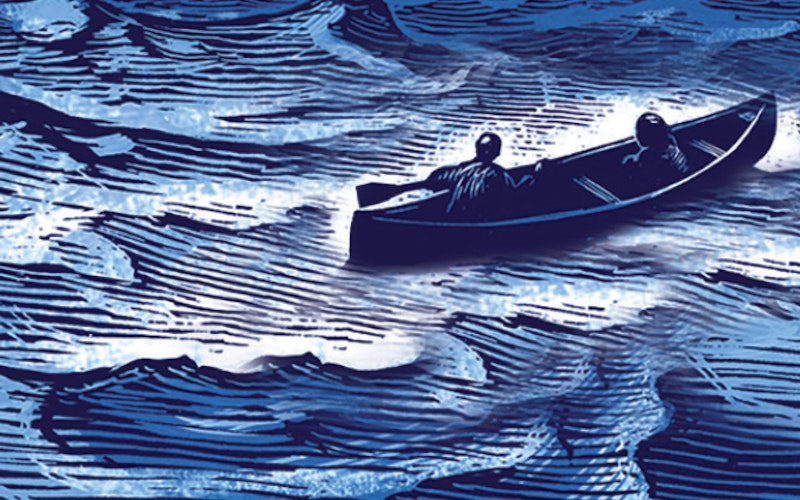
Culture At Large
Religious Fanaticism in The Book of Dust
In La Belle Sauvage, the first volume of his new fantasy trilogy The Book of Dust, Philip Pullman holds a surprisingly realistic mirror to a parallel universe of intertwining politics, worldviews, and morality.
La Belle Sauvage describes a Miltonesque world of magical realism set in present-day London. The story begins: “Three miles up the river Thames from the center of Oxford, some distance from where the great colleges of Jordan, Gabriel, Balliol, and two dozen others contended for mastery in the boat races…” The scene is familiar and eloquently described, yet at the same time it is on this very river that the protagonist, Malcolm Polstead, later embarks on a dangerous adventure and meets mermaids, water fairies, and a figure that looks much like Poseidon. Drawing his inspiration from Homer to Keats and everywhere in between, Pullman imaginatively creates a novel with resonances to our own world, while still reminding readers that things are not the same.
The narrative, packed with drama and suspense from beginning to end, follows the rise of a theocratic government called the Magisterium (also commonly called “The Church”). This regime takes over England and enforces a strict code of law that eerily resembles our own American political climate: an extreme form of conservative religion pervades the land; differing opinions on any subject, but especially those that relate to God, are punished; intellectual inquiry is discouraged; and even scientific discovery that does not conform to the Magisterium’s religious doctrines is banned.
Some Christians will not want to touch this book after the controversies surrounding Pullman’s last trilogy, His Dark Materials. When the first installment of that trilogy was published and subsequently produced as a film, titled The Golden Compass, Christian groups across the nation, from Focus on the Family to First Things to the Christian Research Institute, spoke out against the series, arguing that Pullman is an anti-Christian author who is trying to “kill God.”
The fact that Pullman’s new trilogy, The Book of Dust, is set in the same parallel universe as His Dark Materials and serves as a prequel to the latter may only convince some that Pullman is continuing his witch hunt against Christianity. But could something else be going on?
Some Christians will not want to touch this book.
Much of Pullman’s own childhood is reflected in the perspective and experiences of La Belle Sauvage’s protagonist, Malcolm Polstead. The author himself grew up in a strict Roman Catholic home in England, where theological debates were banned and disobedience was severely punished. Malcom, a budding philosopher, is a spitting image of the author-as-child. Pullman’s ruminations on these experiences in his fantasy series feel less like a critique of religion and more like an attack against religious fanaticism.
It’s important to note that Malcolm is neither an atheist nor a religious fanatic. Though he dislikes the Magisterium, his first and closest friends are a group of friendly nuns at a local priory, who happily, though reservedly, talk to him about the mysteries of life, from the creation of the world to matters of consciousness. This is an important nuance, I think, in Pullman’s universe. Not every religious person is cruel or close-minded, and some can be religious without supporting the status quo (the Magisterium). If the nuns have a flaw, it would simply be that, though they do not support the Magisterium’s activities, they passively continue to remain subservient to its leadership.
Malcolm, on the other hand, joins arms with a secret organization largely comprised of independent scholars and professors called “Oakley Street.” If one was to read this narrative superficially, it might look like Pullman is endorsing an attack on organized religion by secular thinkers. But this is far from true. One of the founding members of Oakley Street explains their mission to Malcolm as follows: “You know who the enemy is, so you know what we’re fighting. Remember what is at stake. The right we have to speak and think freely, to pursue research into any subject under the sun—all that would be destroyed. That is worth fighting for, don’t you agree?” Malcolm fights for a peaceable union between religion and free thinking, for philosophy and scientific discovery to not be seen as threats to religion, and for an allowance of differing worldviews.
Though Pullman wrote The Book of Dust with his own childhood experiences in England in mind, I can’t help but see striking parallels to American evangelicalism today. With the rise of President Donald Trump, many Christians have further embraced extreme, fundamentalist positions when it comes to issues of race, immigration, and science, and have expressed those views in triumphalist terms. In The Book of Dust, the Magisterium displays a similar close-mindedness and authoritarianism. Perhaps American Christians would do well to read this series with an ounce of self-reflection and consider how we treat those with differing worldviews. Do we share our faith as a gift or wield it like a weapon? Do we show regard for a person’s humanity in the way we converse with him or her, or are we more like the Magisterium, attacking and demonizing those who think differently from us?
Topics: Culture At Large